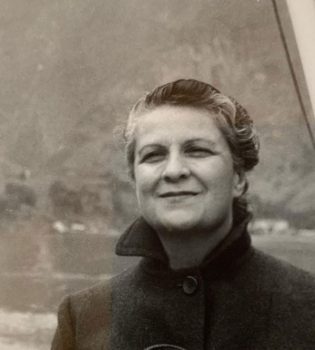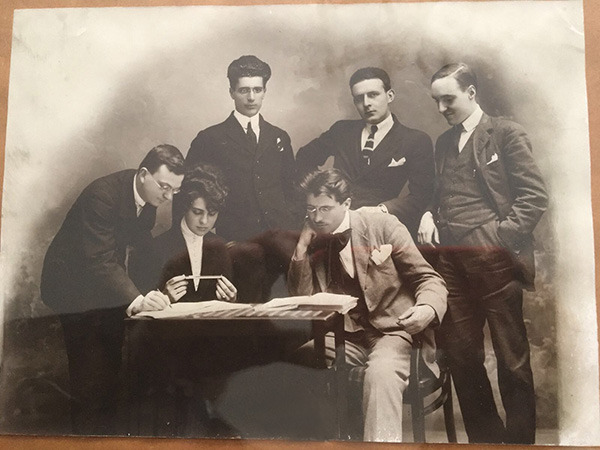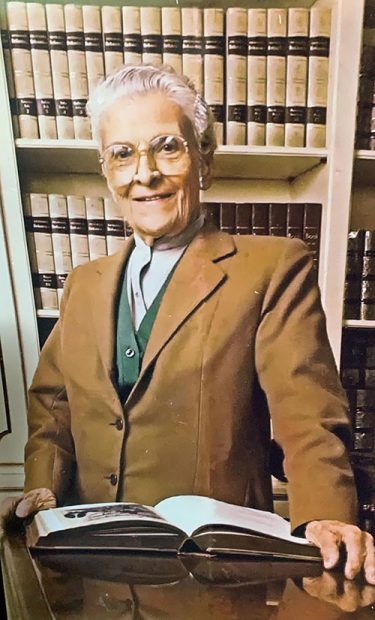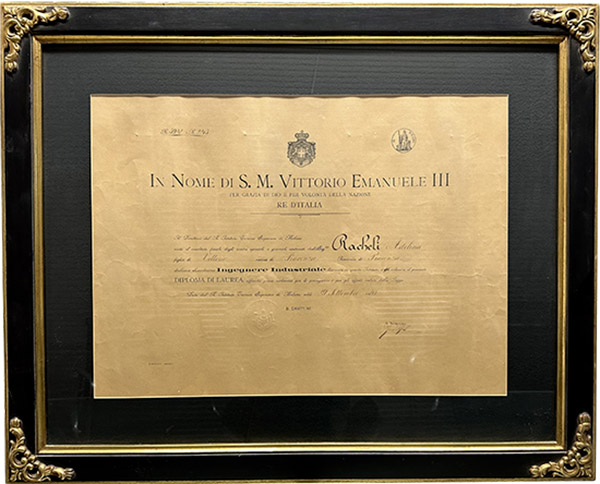The History of Racheli Firm
Racheli was originally established in 1925 by its founder, the engineer Adele Racheli, a visionary woman of great brilliance, intelligence, and curiosity, thus since the beginning the Firm has been known as the “History patents from a female perspective”.
At only 23 years of age, Adele Racheli graduated in Industrial Engineering at the Polytechnic Institute of Milan, one of the leading engineering schools in the world, of which she was also the first female graduate, being therefore a pioneer of her generation.

"The task of the 'technical' woman
in modern life is that of a wise
and competent moderator of the follies
into which we have so far been dragged into
by the eagerness for profit
and the insane admiration for progress
that is becoming science fiction
and that is dragging humanity
towards the unworthy end of the intellect
we have been given”.
From Adele Racheli’s speech at an AIDIA conference in 1971
The Foundation of the Racheli Firm
Soon after the First World War, Adele Racheli decided to explore the almost unknown world of Industrial Property. Business at that time, almost unaware of the subject matter, used to turn to professional firms to protect their exclusive rights and Adele, even in those days, assisted inventors in drafting patents and in all the bureaucratic formalities required by the Italian Patent and Trademark Office (UIBM). Adele not only had a renowned Italian clientele, but also a foreign one.
Thanks to her classical studies, she knew five languages and translated foreign patent texts into Italian with impressive speed.

A Female Firm
For several decades, Ms. Racheli employed only women in her firm, because she firmly believed in their ability to learn, in their tenacity, and in the need to make them understand that work was the real key to women’s emancipation. She was convinced that work represented a right and a duty at the same time.
Adele Racheli was a forerunner of male-female equality. She applied the same salary treatment to his employees, whether they were men or women, she granted them maternity and sick leave, a rare case at the time when women were dismissed in case of marriage or maternity.

She stood out for her human qualities, not only in the professional, but also in the social sphere. She was a woman without prejudice, who did her utmost to ensure that all women of her acquaintance could study, work, and have a family.
She herself had five children and many grandchildren, but nonetheless she was very involved in socio-cultural activities, so much so that until the last years of her life, she held the offices of President of the Association of Italian Women University Graduates and President of the Casa della Laureata, which she founded for female university students who did not have financial means.
She was also one of the founders of AIDIA, the Italian Association of Women Engineers and Architects, founded in 1957, of which Ms. Racheli held the position of National President. In 2023, AIDIA, in collaboration with Polytechnic Institute of Milan has dedicated a scholarship to Adele Racheli, which will be awarded to a deserving female student of the renowned University.
Growing up in a rural setting, in the province of Parma, she always remained attached to the land, so much so that she dedicated herself to teaching silkworm breeding at the Agricultural School of Monza. She became the promoter of various initiatives aimed at educating the younger generations in “responsible work”.
The Racheli Firm in the second half of the 20th Century
The Second World War, the bombing in Milan, and the racial laws, which threatened some of Adele Racheli’s loved ones, led her to moving to Switzerland with her husband Costante Domenighetti and their children. She continued her business there in difficult conditions while giving asylum to many Jewish women.
When they returned to Milan, with the restart of work, large foreign companies operating in the field of industrial materials, of artificial films, industrial machines, motors, and many Italian inventors, despite not having the economic resources of other countries, began to extend their patents to Italy and to explore scientific fields, such as chemistry.
Ms. Racheli followed the patenting procedure for one of the most significant scientific discoveries of our time, the polypropylene, which won its inventor Natta the Nobel Prize. Unfortunately, no written documentation has been found in this regard, but the story was passed on orally by those closely associated with her, not least because the engineer, in addition to all other qualities, had that of confidentiality and humility.
In the 1980s she was awarded with the prestigious Milanese honour Ambrogino d’Oro, as an example of great her contribution to Milanese life.
Ms. Racheli reserved the same attention to the researcher of a large company as well as to the independent inventor anxious to protect a technical solution fruit of his own inventiveness.
Always smiling, she had great sympathy for inventors, and she was delighted when they succeeded in reaching agreements with companies capable of commercially exploiting their invention or when they could undertake said exploitation successfully and on their own.
Until the end of her life, when she had already passed on the Firm’s management to her twin daughters, Diana Domenighetti, who oversaw the trademark department, and Dafne Domenighetti, who oversaw the patent department, she would go to the office, wearing her ever-present trouser suit and strictly white piqué shirt with pocket, to ensure that everything was perfect.

Today Iris Bilardo, Adele’s granddaughter and third generation of the Racheli Firm, carries on the business alongside with a staff of assistants and professionals, mostly competent and responsible women, who support her in organising and managing the work.
The Racheli Firm manages thousands of trademarks and patents, both Italian and abroad; it assists clients in the definition of integrated protection strategies; it contributes to the dissemination of the culture of protecting innovation, also through the organisation of in-person and webinar training sessions, aimed at developing a greater awareness towards the adoption of business methods, such as to allow for an adequate protection of intangible strategic assets, through the proper maintenance of exclusive rights.

